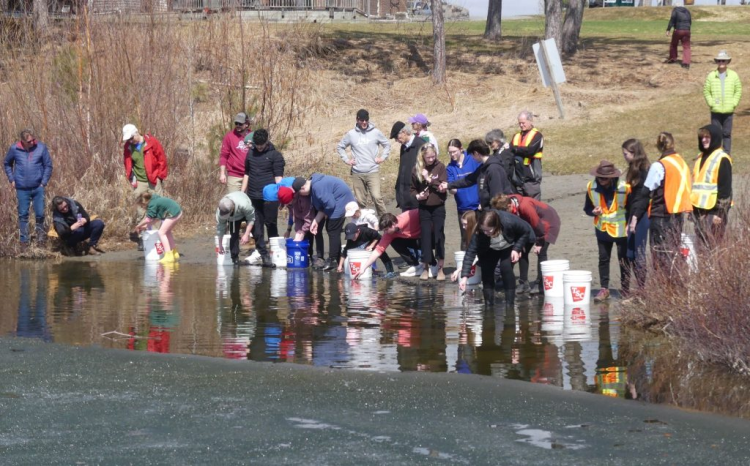Students from Lo-Ellen Park Secondary School released about 1,000 yearling Lake Trout into Nepahwin Lake on Thursday, April 24, 2025. The event was hosted by the Idylwylde Golf and Country Club, a Certified Audubon Cooperative Sanctuary Program Golf Course, and organized by the Nepahwin Lake Watershed Stewardship Group.
The students were part of the Specialist High Skills Major (SHSM) program in the Environment. The program includes experiential learning through community outreach. Partners gathered to support the event's aspirational goal - "It takes a Community and Clean Water to raise a Lake Trout ".

Student Audrey Seaton captured the spirit of the event. "Today's Lake Trout release is a symbol of our community's commitment to protecting the beautiful lakes of Sudbury, so that we can keep our aquatic ecosystem healthy. What is Sudbury without its lakes?," she said. "We are protecting recreational spaces, supporting biodiversity and raising awareness of the importance of local action. Let's keep working together to protect what we have and never take these lakes for granted".
Nepahwin Lake's water quality has declined in the past decades due to urban run-off contaminated with phosphorus and winter salt (chloride) entering the lake, resulting in murky algal growths and it has become one of the saltier lakes in Ontario.
Nepahwin Lake was called Trout Lake in the early 1900s because of its thriving Lake Trout population, but the species disappeared from fish surveys in recent decades. Laurentian University scientists provided context for why Lake Trout are important indicators of a healthy ecosystem.
"Lake Trout thrive in deep, cold and oxygen rich-lakes and are particularly vulnerable to the effects of urban run-off contaminants such as phosphorus and chloride entering the lake," said Dr. John Gunn, Professor Emeritus.
Dr. Elizabeth Favot, Assistant Professor, School of Natural Sciences described how her Nepahwin Lake research is studying the lake's bottom mud' cores spanning the past 250 years to present. The mud tells the story of the lake's past natural state transitioning to its recent urbanized state as it became contaminated (e.g. with phosphorus and chloride).
This research reconstructs lake oxygen and nutrient levels from the past when the lake trout thrived, how these conditions are responding to climate change, and how aquatic species have adapted, disappeared or been replaced - helping to set management targets for lake conditions that will support healthy fish populations.
City Councillor Deb McIntosh attended the Lake Trout release with her visiting grandchildren. Councillor McIntosh was thrilled to see the children transport a pail of small Lake Trout for release and experience the joy of playing on the shore of a City of Greater Sudbury urban lake, a natural asset warranting our protection.
Participants of all ages have a watchful eye and gentle touch as they release yearling Lake Trout to their new home in Nepahwin Lake.
Other valued participants included representatives from the Ministry of Natural Resources (providing the fish), the City of Greater Sudbury Lake Water Quality Program, Junction Creek Stewardship Committee, and Laurentian University's Environmental Sustainability Committee.
"To give today's released Lake Trout a fighting chance, as residents we have a role. We need to reduce or eliminate the use of winter salt on our properties and adhere to the City's by-laws that require residential fertilizers be phosphorus-free and shoreline natural vegetation buffer zones remain intact," said Gary Bota, Co-Chair of the Nepahwin Lake Watershed Stewardship Group. "We can also consider naturalizing our privately owned established gentrified shorelines. Collectively, we can do it."












